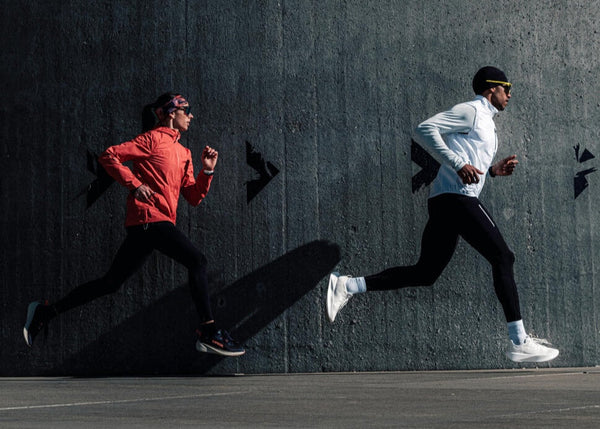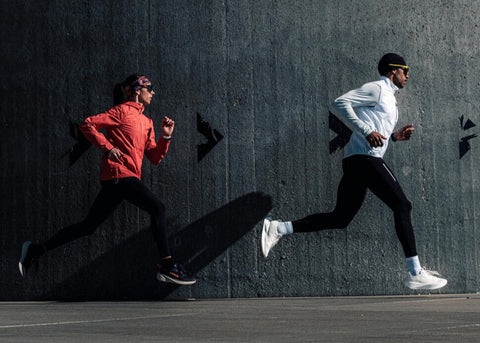
Hydration When Running
Share
Hydration - essential for runners
When you run, the energy created by muscle contraction generates heat. The body releases this heat by perspiring, a natural mechanism which regulates the body's heat. Runners lose water when they sweat, and sometimes in large quantities: a marathoner loses an average of 4 litres of water during a race! Water loss varies between 0.5 and 1 litre per hour during a running session. But that can reach 2 litres depending on the intensity and weather conditions, causing dehydration. If you don't compensate for the water loss, you performance will suffer: the loss of 1% of your body weight in water decreases your performance by 10%! This can also have other negative effects on your body: increased heart rate, fatigue, headache, dizziness, muscular damage, tendinitis etc
When to drink
- Before exercising: remember to drink during the hour before a run or race: 200 to 300ml is enough (drunk in small quantities)
- Don't wait until you feel thirsty when running. That's the sign that the body is already dehydrated! Drink small mouthfuls of 100 to 150ml regularly when running. If necessary, program a reminder on your watch every 15 to 20 minutes, and don't wait for pit stops during a race.
- After running, it is essential to recover the water you have eliminated. It's interesting to weigh yourself before and after a run to calculate the quantity of water lost you need to compensate. Tip: multiply the amount of body weight lost during your session by 1.5 (taking into account what you drank while running) to know how much water you need to drink progressively. The stomach can only absorb 750ml per hour. Completely rehydrating your body takes time: there is no point in forcing yourself to drink too much!
Tip: check your urine before you go to bed. If it's clear you have recovered the water lost during the day.
Not only water!
When you perspire, you lose minerals such as sodium, potassium, magnesium, zinc etc. These electrolytes are essential to maintain a balance in your fluids, nerves, muscles and blood. That's why it's important to compensate the loss with isotonic drinks, gels, or fruit jellies which contain electrolytes and are rich in carbohydrates. Water suffices for a workout of up to one hour. Over one hour, it is important to absorb supplements to maintain your effort for the duration of the workout.
It's just as important to drink after a workout to restore your water, mineral and energy reserves. Sparkling water is better than still water as it's richer in minerals (or try a recovery drink), also useful for draining all the waste produced in the body while running.
Traps to avoid
- Do not test energy drinks and food during a race. It's important to test them before, when training, to be sure your digestive system reacts correctly to consuming them.
- Some drinks - such as soft drinks and fruit juice which are often too rich in fructose, or liquids which are too cold, or even sparkling water - may also cause intestinal issues during a race.
- Finally do not confuse sports energy drinks with other "energy" drinks. "Energy" drinks contain stimulants and are not suited to your needs when running. On the other hand, a sports energy drink is adapted to an athlete's nutritional needs during physical exertion.
Drinking when running is essential for your performance and, most importantly, your health! It may seem tiresome to some of you, always carrying a small water flask with you to avoid going more than a half an hour without taking a few gulps. There are now many solutions for carrying water, optimized with hydration belts and bags for the runner's comfort. Have a great run!















